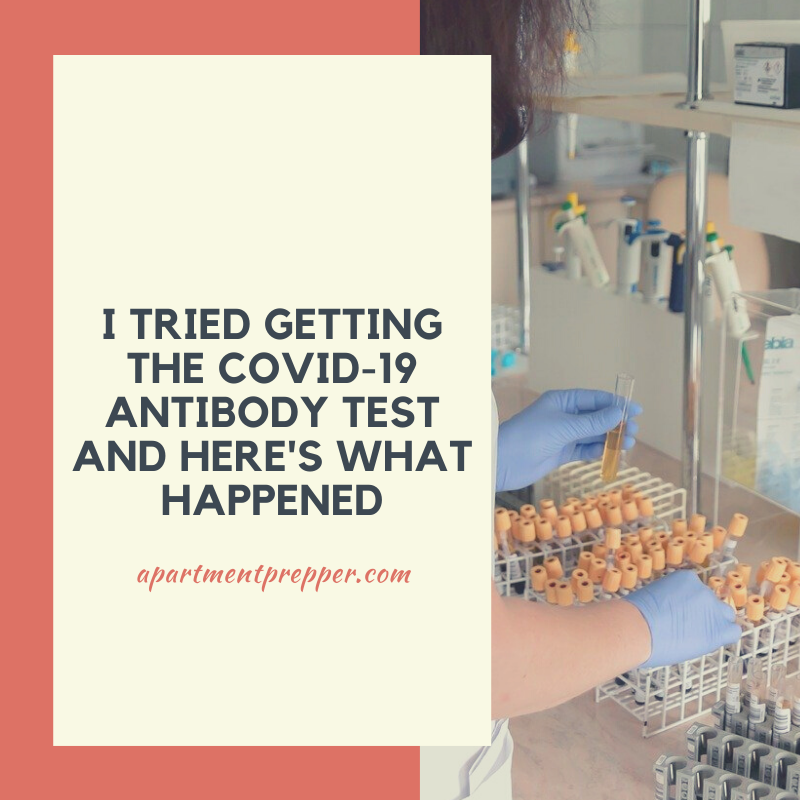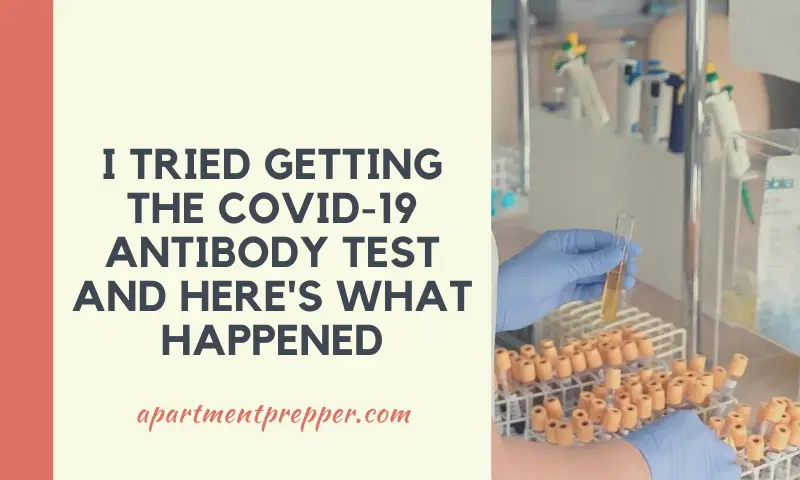This post is by Bernie Carr, apartmentprepper.com
This past week, I decided I wanted to try getting the COVID-19 antibody test, that is now available in many areas. It is possible to catch the coronavirus and not know it as many people remain symptom free. Also, many people report having gotten very sick back in January before anyone had even heard about the new coronavirus. So, I thought, if my insurance covers it, I will try and get the antibody test.
What is the anti-body test?
The body makes anti-bodies anytime it fights an infection. An anti-body test, also known as a serology test is a blood test that will show whether your body’s immune system has defended against the infection. It does not to diagnose whether you have it.
What my insurance required
According to the website of my insurance company, as well as the customer service line, the antibody test would be covered by the insurance at 100%. But they require a doctor’s prescription to get the test. You can either see your regular doctor, or see a doctor online.
The online doctor visit
I opted for the online doctor visit. First, I had to download my insurance company’s app on my phone. Next, I requested a virtual doctor’s appointment via the app. I filled out the form and the reason for the visit I chose was “COVID-19 concerns” Remember, I am not sick, I just wanted to get the anti-body test.
The app then offers a date and time for the virtual visit of which I chose a mid-morning appointment.
At the appointed time, I logged into the app, clicked the virtual visit icon and placed in a “virtual waiting room.” I can see a small video of my face on the bottom corner of the screen. There’s a note that the doctor will see you shortly. After a 10 minute wait, the doctor logged in.
What happened?
When I saw the doctor online, I explained that I wanted a prescription to take the test. He said a lot of people wanted to take the test as well, however, he indicated that the virtual visit docs were instructed by their company not to authorize the antibody test.
He went on to explain that finding out whether you have antibodies only shows what happened in the past. It is unknown whether having antibodies from catching the coronavirus previously will protect you from catching it again. Therefore, the doctor felt it does not help you in any way.
I called my insurance company’s member services and told them I was given wrong information when I was told the virtual visit doctor can order the antibody test. The rep insisted the virtual doctor should have been able to prescribe the antibody test. Since there is no out of pocket charge for the visit, I will not have to pay for the consultation.
What the doctor told me makes sense: taking the test and knowing you have antibodies only proves a past illness. According to the CDC,
“It’s unclear if those antibodies can provide protection (immunity) against getting infected again. This means that we do not know at this time if antibodies make you immune to the virus.”
However, I do feel that if more people took the test and found out they had it will make a difference statistically. For now, I will hold off on trying again until I find out more information.
In conclusion
While the virtual doctor visit did not help me obtain the COVID-19 antibody test, I believe it is still a great way to quickly see a doctor when you have non-emergency issues such as colds, allergies, sinus infection, urinary tract infection, headache or migraine, diarrhea or vomiting, back pain. It was a fast and efficient process. If I feel the need to get the COVID-19 antibody test done at a future date, I will find another way such as contacting an approved testing laboratory but this will need further research.
********************************************************************
We are an affiliate of Amazon.com, which means we received a small commission if you click through one of our Amazon links when you shop, at totally no cost to you. This helps keep the lights on at the blog. Thanks!
About the author:
Bernie Carr is the founder of Apartment Prepper. She has written several books including the best-selling Prepper’s Pocket Guide, Jake and Miller’s Big Adventure, The Penny-Pinching Prepper and How to Prepare for Most Emergencies on a $50 a Month Budget. Her work appears in sites such as the Allstate Blog and Clark.com, as well as print magazines such as Backwoods Survival Guide and Prepper Survival Guide. She has been featured in national publications such as Fox Business and Popular Mechanics. Learn more about Bernie here.
Image by Michal Jarmoluk from Pixabay



When I donated blood last week, one test they are now doing on all bloods is to test them for the antibodies. If you have it, they will tell you and ask for more blood.
Hi Susan,
Good to know. Thanks for the comment.